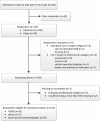Simulation-based training and assessment of non-technical skills in the Norwegian Helicopter Emergency Medical Services: a cross-sectional survey
- PMID: 25344577
- PMCID: PMC4518743
- DOI: 10.1136/emermed-2014-203962
Simulation-based training and assessment of non-technical skills in the Norwegian Helicopter Emergency Medical Services: a cross-sectional survey
Abstract
Background: Human error and deficient non-technical skills (NTSs) among providers of ALS in helicopter emergency medical services (HEMS) is a threat to patient and operational safety. Skills can be improved through simulation-based training and assessment.
Objective: To document the current level of simulation-based training and assessment of seven generic NTSs in crew members in the Norwegian HEMS.
Methods: A cross-sectional survey, either electronic or paper-based, of all 207 physicians, HEMS crew members (HCMs) and pilots working in the civilian Norwegian HEMS (11 bases), between 8 May and 25 July 2012.
Results: The response rate was 82% (n=193). A large proportion of each of the professional groups lacked simulation-based training and assessment of their NTSs. Compared with pilots and HCMs, physicians undergo statistically significantly less frequent simulation-based training and assessment of their NTSs. Fifty out of 82 (61%) physicians were on call for more than 72 consecutive hours on a regular basis. Of these, 79% did not have any training in coping with fatigue. In contrast, 72 out of 73 (99%) pilots and HCMs were on call for more than 3 days in a row. Of these, 54% did not have any training in coping with fatigue.
Conclusions: Our study indicates a lack of simulation-based training and assessment. Pilots and HCMs train and are assessed more frequently than physicians. All professional groups are on call for extended hours, but receive limited training in how to cope with fatigue.
Keywords: accident prevention; assessment; critical care transport; prehospital care, helicopter retrieval; training.
Published by the BMJ Publishing Group Limited. For permission to use (where not already granted under a licence) please go to http://group.bmj.com/group/rights-licensing/permissions.
Figures



Similar articles
-
A comparative study on the frequency of simulation-based training and assessment of non-technical skills in the Norwegian ground ambulance services and helicopter emergency medical services.BMC Health Serv Res. 2018 Jul 3;18(1):509. doi: 10.1186/s12913-018-3325-1. BMC Health Serv Res. 2018. PMID: 29970079 Free PMC article.
-
Training and assessment of non-technical skills in Norwegian helicopter emergency services: a cross-sectional and longitudinal study.Scand J Trauma Resusc Emerg Med. 2019 Jan 7;27(1):1. doi: 10.1186/s13049-018-0583-1. Scand J Trauma Resusc Emerg Med. 2019. PMID: 30616604 Free PMC article.
-
Compliance With a National Standard by Norwegian Helicopter Emergency Physicians.Air Med J. 2018 Jan-Feb;37(1):46-50. doi: 10.1016/j.amj.2017.10.001. Epub 2017 Nov 29. Air Med J. 2018. PMID: 29332776
-
Merits and capabilities of helicopter emergency medical service (HEMS) in traumatized patients.Technol Health Care. 2012;20(5):435-44. doi: 10.3233/THC-2012-0691. Technol Health Care. 2012. PMID: 23079947 Review.
-
Helicopter EMS transport outcomes literature: annotated review of articles published 2004-2006.Prehosp Emerg Care. 2007 Oct-Dec;11(4):477-88. doi: 10.1080/10903120701537097. Prehosp Emerg Care. 2007. PMID: 17907037 Review.
Cited by
-
Prehospital response model and time to CT scan in blunt trauma patients; an exploratory analysis of data from the head injury retrieval trial.Scand J Trauma Resusc Emerg Med. 2015 Mar 20;23:28. doi: 10.1186/s13049-015-0107-1. Scand J Trauma Resusc Emerg Med. 2015. PMID: 25886844 Free PMC article. Clinical Trial.
-
Non-technical skills evaluation in the critical care air ambulance environment: introduction of an adapted rating instrument--an observational study.Scand J Trauma Resusc Emerg Med. 2016 Mar 8;24:24. doi: 10.1186/s13049-016-0216-5. Scand J Trauma Resusc Emerg Med. 2016. PMID: 26955943 Free PMC article.
-
"Hand-it-on": an innovative simulation on the relation of non-technical skills to healthcare.Adv Simul (Lond). 2016 Dec 5;1:30. doi: 10.1186/s41077-016-0031-0. eCollection 2016. Adv Simul (Lond). 2016. PMID: 29449999 Free PMC article.
-
Game Experience and Learning Effects of a Scoring-Based Mechanic for Logistical Aspects of Pediatric Emergency Medicine: Development and Feasibility Study.JMIR Serious Games. 2021 Mar 11;9(1):e21988. doi: 10.2196/21988. JMIR Serious Games. 2021. PMID: 33704081 Free PMC article.
-
A comparative study on the frequency of simulation-based training and assessment of non-technical skills in the Norwegian ground ambulance services and helicopter emergency medical services.BMC Health Serv Res. 2018 Jul 3;18(1):509. doi: 10.1186/s12913-018-3325-1. BMC Health Serv Res. 2018. PMID: 29970079 Free PMC article.
References
-
- Grote G. Safety management in different high-risk domains – All the same? Saf Sci 2012;50:1983–92.
-
- Gordon M, Darbyshire D, Baker P. Non-technical skills training to enhance patient safety: a systematic review. Med Educ 2012;46:1042–54. - PubMed
-
- Flin R, Patey R. Improving patient safety through training in non-technical skills. Br Med J 2009;339:b3595. - PubMed
Publication types
MeSH terms
LinkOut - more resources
Full Text Sources
Other Literature Sources
Miscellaneous
